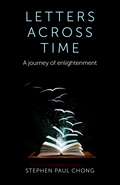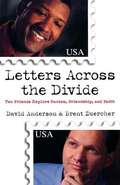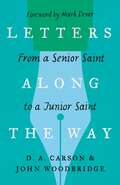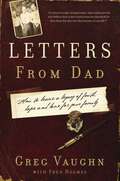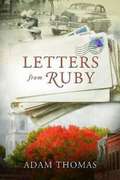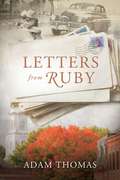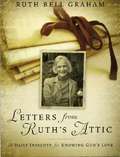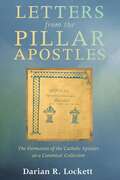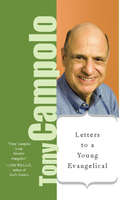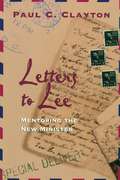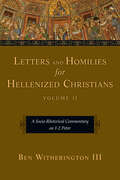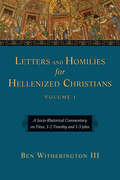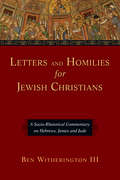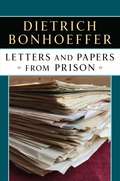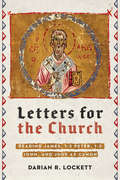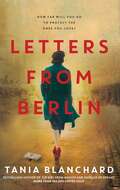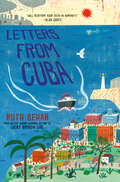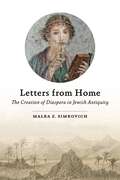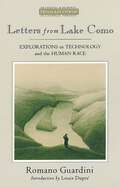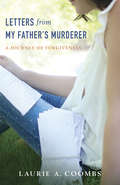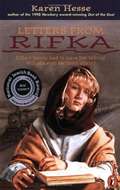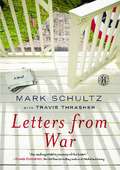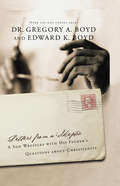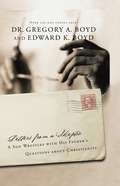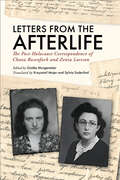- Table View
- List View
Letters Across Time: A Journey of Enlightenment
by Stephen Paul ChongLetters Across Time is an anthology of modern work and personal life that will open up deep insights into how to realise your fullest potential and achieve your life s purpose. It provides practical suggestions to enable you to improve the richness and quality of your life, yet it allows you to find your own pathway. Through the use of an irresistible story of a family of ducks their trials, tribulations and life achievements, Letters Across Time empowers you to realise your own self-worth and apply that to your chosen vocation, family, community and workplaces in which you live and prosper.
Letters Across the Divide: Two Friends Explore Racism, Friendship, and Faith
by David Anderson Brent ZuercherA black minister and a white businessman candidly discuss the obstacles, stereotypes, and sins that inhibit interracial reconciliation. Provocative and honest.
Letters Along the Way: From A Senior Saint To A Junior Saint
by D. A. Carson John D. Woodbridge Mark DeverWhen student Tim Journeyman first wrote to family friend Dr. Paul Woodson, he didn’t know it would start a fifteen-year mentorship that would shape his life and Christian faith. Within their candid letters are words of real-world wisdom—from a “senior saint” to a “junior saint”—covering various areas of living, from the theological to the everyday. Written as fictional correspondence between two men at different stages of life and faith, the novel Letters Along the Way provides important, biblical perspectives on topics such as apologetics, science and faith, inerrancy of the Bible, heart versus head faith, prayer, the changing face of evangelicalism, and trends emerging in American culture. Published in partnership with the Gospel Coalition.
Letters From Dad: How to Leave a Legacy of Faith, Hope, and Love for Your Family
by Greg VaughnWhat began as a passion in the heart of a father of seven has led to a new men's movement. Many fathers are asking "How do I leave something of lasting value to my children and grandchildren?" This book helps dads leave treasured words of love and blessing to their children.
Letters From Ruby
by Adam ThomasWhen the newly ordained Episcopal priest Rev. Calvin Harper arrives in Victory, West Virginia, to be the pastor at an ailing parish, he has no idea how much he still has to learn about being a priest. Thankfully, Ruby Redding takes the young man under her wing and teaches him everything she has learned throughout her long, storied life. Seminary never taught Calvin that the only true way to be a witness to God's presence in this world is to remain in relationship with people no matter what life throws at them. His studies never taught him that detachment is the bane of ministry. He never learned that deep grief comes only from deep love. But in his first year in Victory, Calvin learns all this and more from Ruby, a woman so full of God's light that it can't help but spill onto the people around her.
Letters From Ruby
by Adam ThomasWhen the newly ordained Episcopal priest Rev. Calvin Harper arrives in Victory, West Virginia, to be the pastor at an ailing parish, he has no idea how much he still has to learn about being a priest. Thankfully, Ruby Redding takes the young man under her wing and teaches him everything she has learned throughout her long, storied life. Seminary never taught Calvin that the only true way to be a witness to God's presence in this world is to remain in relationship with people no matter what life throws at them. His studies never taught him that detachment is the bane of ministry. He never learned that deep grief comes only from deep love. But in his first year in Victory, Calvin learns all this and more from Ruby, a woman so full of God's light that it can't help but spill onto the people around her.
Letters From Ruth's Attic: 31 Daily Insights For Knowing God's Love
by Ruth GrahamEver feel like running away? Ever asked, "Why me?" Have you doubted whether God is listening? Do you sometimes get discouraged because you are just plain tired, or secretly wonder how God could possibly find pleasure in you? If so, this collection of unique reflections from Ruth Bell Grahams pen will lift your spirits, stir your smile, and encourage you in your walk with God. Ruth Bell Graham (1920-2007), wife of Billy Graham, often called herself a pack rat, alluding to the attic she loaded with the stuff of memories as well as with simple treasures others had overlooked. In a similar way she packed her writing with illustrations stored in memory and stories collected from forgotten writers and ancient sources, then added her fresh thoughts. One longtime friend said Ruths writing revealed an alchemist's gift for transforming ordinary experiences and everyday observations into insights of wisdom.
Letters From The Pillar Apostles: The Formation Of The Catholic Epistles As A Canonical Collection
by Darian R. LockettRather than reading the Catholic Epistles in isolation from each other--understanding their individual historical situations as the single, determinative context for their interpretation--this study argues that a proper understanding of these seven letters must equally attend to their collection and placement within the New Testament canon. Resisting the judgment of much of historical-critical analysis of the New Testament, namely, that the concept of canon actually obscures the meaning of these texts, it is the canonical process by which the texts were composed, redacted, collected, arranged, and fixed in a final canonical form that constitutes a necessary interpretive context for these seven letters. This study argues that through reception history and paratextual and compositional evidence one can discern a collection consciousness within the Catholic Epistles such that they should be read and interpreted as an intentional, discrete canonical sub-collection set within the New Testament. Furthermore, the work argues that such collection consciousness, though not necessarily in the preview of the original authors (being perhaps unforeseen, yet not unintended), is neither anachronistic to the meaning of the letters nor antagonistic to their composition.
Letters To A Young Evangelical
by Tony CampoloNamed by Christianity Today as one of the twentyfive most influential preachers of the last fifty years, best-selling author Tony Campolo has spent decades calling on readers and audiences around the world to live their faith through committed activism. A tireless crusader for human rights and the eradication of world poverty, Campolo is a "Red Letter" Christian--he reminds us that when Jesus spoke, he spoke of social justice. But the Religious Right and social conservatives have hijacked His message in the name of Republican politics. They have corrupted the faith by ignoring the true message of Christ and focusing instead on narrow "wedge" issues to win political campaigns. In Letters to a Young Evangelical, Campolo calls on evangelicals of all ages to reject the false pieties of the Religious Right. With his trademark candor and wit, he offers sage advice to seekers who are trying to live their faith in a modern world that is politically polarized and predominantly secular. He is unafraid to touch on the hot-button topics that divide believers in America and around the world: abortion, gay rights, war, capital punishment, feminism, and the environment. An activist, a visionary, and a man of deep faith, Tony Campolo offers guidance not only for young evangelicals, but for seekers of all ages and faiths.
Letters To Lee: Mentoring The New Minister
by Paul C. ClaytonEach year, hundreds of newly ordained pastors enter their first congregations, unsure whether seminary training has truly prepared them for the day-to-day work of parish ministry. Author and professor Paul C. Clayton, D. Min., guides new ministers through the growth processes of parish ministry in Letters to Lee-Mentoring the New Minister, just published by the Alban Institute. Clayton is an ordained minister in the United Church of Christ and Special Assistant to the President at Andover Newton Theological School in Newton Centre, MA, where he teaches a course on "Practicalities of Parish Ministry." In Letters to Lee, he draws on his years in ministry using a unique epistolary format-from an older, experienced pastor to a novice. He addresses issues such as preparing for weddings, funerals, and baptisms; planning education, evangelism, and stewardship programs; growing spiritually; developing a leadership style; and maintaining personal and professional boundaries.
Letters and Homilies for Hellenized Christians: A Socio-Rhetorical Commentary on 1-2 Peter (Letters and Homilies Series #Volume 2)
by Ben Witherington IIILetters and Homilies for Hellenized Christians, Volume 2
Letters and Homilies for Hellenized Christians: A Socio-Rhetorical Commentary on Titus, 1-2 Timothy and 1-3 John (Letters and Homilies Series #Volume 1)
by Ben Witherington IIILetters and Homilies for Hellenized Christians
Letters and Homilies for Jewish Christians: A Socio-Rhetorical Commentary on Hebrews, James and Jude (Letters And Homilies Ser.)
by Ben Witherington IIIIn this commentary on Hebrews, James and Jude, Ben Witherington III applies his socio-rhetorical method to elucidate these letters within their primarily Jewish context, probing the social setting of the readers and the rhetorical strategies of the authors of the letters.
Letters and Papers from Prison: Dietrich Bonhoeffer Works (Dietrich Bonhoeffer Works)
by Dietrich BonhoefferOne of the great classics of prison literature, Letters and Papers from Prison effectively serves as the last will and testament of the Lutheran theologian Dietrich Bonhoeffer. Dietrich Bonhoeffer was a young German pastor who was executed by the Nazis in 1945 for his part in the “officers’ plot” to assassinate Adolf Hitler. This expanded version of Letters and Papers from Prison shifts the emphasis of earlier editions of Bonhoeffer’s theological reflections to the private sphere of his life. His letters appear in greater detail and show his daily concerns. Letters from Bonhoeffer’s parents, siblings, and other relatives have also been added, in addition to previously inaccessible letters and legal papers referring to his trial. Acute and subtle, warm and perceptive, yet also profoundly moving, the documents collectively tell a very human story of loss, of courage, and of hope. Bonhoeffer’s story seems as vitally relevant, as politically prophetic, and as theologically significant today, as it did yesterday.
Letters for the Church: Reading James, 1-2 Peter, 1-3 John, and Jude as Canon
by Darian R. LockettThe Catholic Epistles often get short shrift. Tucked into a few pages near the back of our Bibles, these books are sometimes referred to as the "non-Pauline epistles" or "concluding letters," maybe getting lumped together with Hebrews and Revelation. Yet these letters, Darian Lockett argues, are treasures hidden in plain sight, and it's time to give them the attention they deserve. In Letters for the Church, Lockett reveals how the Catholic Epistles provide a unique window into early Christian theology and practice. Based on evidence from the early church, he contends that the seven letters of James, 1–2 Peter, 1–3 John, and Jude were accepted into the canon as a collection and should be read together. Here Lockett introduces the context and content of the Catholic Epistles while emphasizing how all seven letters are connected. Each chapter outlines the author, audience, and genre of one of the epistles, traces its flow of thought, and explores shared themes with the other Catholic Epistles. The early church valued the Catholic Epistles for multiple reasons: they defend orthodox faith and morals against the challenges of heretics, make clear that Christianity combines belief with action, and round out the New Testament witness to Christian faith and life. By introducing the coherent vision of these seven epistles, Letters for the Church helps us rediscover these riches.
Letters from Berlin: The Girl From Munich, Suitcase Of Dreams, Letters From Berlin
by Tania BlanchardFrom the bestselling author of The Girl from Munich and Suitcase of Dreams comes an unforgettable tale of love, courage and betrayal inspired by a true story Berlin, 1943 As the Allied forces edge closer, the Third Reich tightens its grip on its people. For eighteen-year-old Susanna Göttmann, this means her beloved adopted family including the man she loves, Leo, are at risk. His mother – Susie&’s godmother – is forced to register as a Jew and wear the Star of David, bearing the resentment of the village she has always called home. Desperate to protect them any way she can, Susie accepts the help of an influential Nazi officer. It means she must abandon any hope of a future with Leo and enter the terrifying world of the Nazi elite. But all is not lost as her newfound position offers more than she could have hoped for … With critical intelligence at her fingertips, Susie seizes a dangerous opportunity to help the resistance. The decisions she makes could change the course of the war, but what will they mean for her family and her future?Praise for Tania Blanchard &‘Packs an emotional punch that will reverberate far and wide&’ Weekly Times &‘Captures the intensity of a brutal and unforgiving war, successfully weaving love, loss, desperation and, finally, hope into a gripping journey of self-discovery&’ Courier Mail &‘A tumultuous journey from order to bedlam, and from naive acceptance of the status quo to the gradual getting of political wisdom&’ Sunday Age &‘Combining historical tragedy, romance, and true stories … Superb and enriching&’ Better Reading
Letters from Cuba
by Ruth BeharPura Belpré Award Winner Ruth Behar's inspiring story of a young Jewish girl who escapes Poland to make a new life in Cuba, while she works to rescue the rest of her familyThe situation is getting dire for Jews in Poland on the eve of World War II. Esther's father has fled to Cuba, and she is the first one to join him. It's heartbreaking to be separated from her beloved sister, so Esther promises to write down everything that happens until they're reunited. And she does, recording both the good--the kindness of the Cuban people and her discovery of a valuable hidden talent--and the bad: the fact that Nazism has found a foothold even in Cuba. Esther's evocative letters are full of her appreciation for life and reveal a resourceful, determined girl with a rare ability to bring people together, all the while striving to get the rest of their family out of Poland before it's too late.Based on Ruth Behar's family history, this compelling story celebrates the resilience of the human spirit in the most challenging times.
Letters from Home: The Creation of Diaspora in Jewish Antiquity
by Malka Z. SimkovichThe announcement by the Persian king Cyrus following his conquest of Babylon in 539 BCE that exiled Judahites could return to their homeland should have been cause for celebration. Instead, it plunged them into animated debate. Only a small community returned and participated in the construction of the Second Temple in Jerusalem. By the end of the sixth century BCE, they faced a theological conundrum: Had the catastrophic punishment of exile, understood as marking God’s retribution for the people’s sins, come to an end?By the Hellenistic era, most Jews living in their homeland believed that life abroad signified God’s wrath and rejection. Jews living outside of their homeland, however, rejected this notion. From both sides of the diasporic line, Jews wrote letters and speeches that conveyed the sense that their positions had ancient roots in Torah traditions. In this book, Malka Z. Simkovich investigates the rhetorical strategies—such as pseudepigraphy, ventriloquy, and mirroring—that Egyptian and Judean Jews incorporated into their writings about life outside the land of Israel, charting the boundary-marking push and pull that took place within Jewish letters in the Hellenistic era. Drawing on this correspondence and other contemporaneous writings, Simkovich argues that the construction of diaspora during this period—reinforced by some and negated by others—produced a tension that lay at the core of Jewish identity in the ancient world. This book is essential reading for scholars and students of ancient Judaism and to laypersons interested in the questions of a Jewish homeland and Jewish diaspora.
Letters from Lake Como: Explorations on Technology and the Human Race
by Romano GuardiniThis book collects a fascinating series of letters written by theologian-philosopher Romano Guardini in the mid-1920s in which he works out for the first time his sense of the challenges of humanity in a culture increasingly dominated by the machine. With prophetic clarity and unsettling farsightedness, Guardini's letters poignantly capture the personal implications and social challenges of living in the technological age — concerns that have now come to fruition seventy years after they were first raised.
Letters from My Father's Murderer: A Journey of Forgiveness
by Laurie A. CoombsAn extraordinary true story of grace, mercy, and the redemptive power of God.When her father was murdered, Laurie Coombs and her family sought justice--and found it. Yet, despite the swift punishment of the killer, Laurie found herself increasingly full of pain, bitterness, and anger she couldn't control. It was the call to love and forgive her father's murderer that set her, the murderer, and several other inmates on the journey that would truly change their lives forever.This compelling story of transformation will touch the deepest wounds and show how God can redeem what seems unredeemable.
Letters from Rifka
by Karen HesseIn letters to her cousin, a young Jewish girl chronicles her family's flight from Russia in 1919 and her own experiences when she must be left in Belgium for a while when the others emigrate to America. Historical fiction.
Letters from War
by Travis Thrasher Mark SchultzPlatinum-selling Christian music artist Mark Schultz pens a novella based on his award-winning song "Letters from War," about a mother's unwavering hope, courage, and steadfast prayers.Every night, Natalie leaves the front porch light on. Just in case. It's been two years since her son, James, went missing while saving the life of a fellow paratrooper in his division. Natalie's faith has sustained her while she awaits word on her son's whereabouts. Well-meaning friends encourages Natalie to move on, but Natalie continues to hope.
Letters from a Skeptic
by Dr Gregory BoydGreg Boyd and his father, Ed, were on opposite sides of a great divide. Greg was a newfound Christian, while his father was a longtime agnostic. So Greg offered his father an invitation: Ed could write with any questions on Christianity, and his son would offer a response.Letters from a Skeptic contains this special correspondence. The letters tackle some of today's toughest challenges facing Christianity, includingDo all non-Christians go to hell?How can we believe a man rose from the dead?Why is the world so full of suffering?How do we know the Bible was divinely inspired?Does God know the future?Each response offers insights into the big questions, while delivering intelligent answers that connect with both the heart and mind. Whether you're a skeptic, a believer, or just unsure, these letters can provide a practical, common-sense guide to the Christian faith.
Letters from a Skeptic: A Son Wrestles with His Father's Questions about Christianity
by Gregory Boyd Edward K. BoydGreg Boyd and his father, Ed, were on opposite sides of a great divide. Greg was a new found Christian, while his father was a longtime agnostic. So Greg offered his father an invitation: Ed could write with any questions on Christianity, and his son would offer a response. Letters from a Skeptic contains this special correspondence. The letters tackle some of today's toughest challenges facing Christianity, including Do all non-Christians go to hell? How can we believe a man rose from the dead? Why is the world so full of suffering? How do we know the Bible was divinely inspired? Does God know the future? Each response offers insights into the big questions, while delivering intelligent answers that connect with both the heart and mind. Whether you're a skeptic, a believer, or just unsure, these letters can provide a practical, common-sense guide to the Christian faith.
Letters from the Afterlife: The Post-Holocaust Correspondence of Chava Rosenfarb and Zenia Larsson
by Goldie MorgentalerExtraordinarily little has been written about how women who survived the Holocaust dealt with life after the war, with the trauma of their immediate pasts, and with the debilitating sense of alienation they felt in a changed world. Letters from the Afterlife chronicles the experiences of two female Holocaust survivors as they adjusted to life in their adopted countries of Canada and Sweden, where they knew neither the language nor the culture.Childhood friends in Poland, Chava Rosenfarb and Zenia Larsson lived through the Lodz Ghetto and the death camps together, parting soon after their liberation from Bergen-Belsen. For the next fifty years, they continued their friendship through letters written in Polish, their only shared language. Despite their continuing traumas and insecurities, Rosenfarb and Larsson went on to become distinguished novelists in their respective languages, Yiddish and Swedish. In 1972, Larsson published her own side of the correspondence translated into Swedish, which caused a temporary rift in their enduring friendship.Letters from the Afterlife, with evocative translations by Krzysztof Majer and Sylvia Söderlind, makes these letters available to an English readership. Rosenfarb’s daughter, Goldie Morgentaler, provides an introduction that establishes the importance of the correspondence from both cultural and historical perspectives and an epilogue that continues Rosenfarb and Larsson’s story after their written exchange was abruptly but temporarily suspended in 1971.
